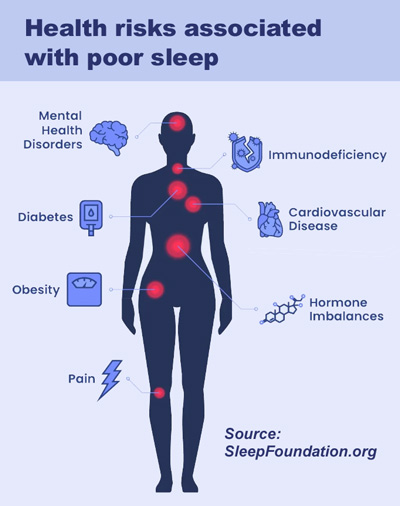According to ongoing research, poor sleep quality negatively impacts immune function, heart health, risk of diabetes, obesity and chronic pain.
But for those who find getting regular sleep a challenge, there is a health risk they may not be aware of: dementia.
According to researchers involved in a new study, a “messy and disjointed” sleep schedule can significantly increase a person’s risk of dementia later in life.
The research team, working in cooperation with the American Academy of Neurology, found that individuals with inconsistent sleep patterns were 53 percent more likely to develop dementia than those with sleep regularity.
The researchers noted that “sleep regularity” refers to having consistency in one’s sleep and wake peiods during each 24-hour period.
This is an important distinction as sleep health recommendations often focus on getting the recommended amount of sleep—seven to nine hours a night—while there is less emphasis on maintaining sleep regularity.
“Our findings suggest the regularity of a person’s sleep is an important factor when considering a person’s risk of dementia,” wrote study author Matthew Paul Pase, PhD, an Associate Professor at Monash University in Melbourne, Australia.
The research was published in Neurology, the medical journal of the American Academy of Neurology, in December 2023.
Study details
While the research was conducted in Australia and was funded by the National Health and Medical Research Council of Australia, the scientists used data from United Kingdom databases to conduct their study.
To gather the data researchers tracked 88,094 United Kingdom residents for an average period of seven years. The average age of the participants was 62.
Participants wore a wrist device for seven days that measured their sleep cycle. Researchers then calculated the regularity of participants’ sleep.
Researchers determined the probability of being in the same sleep state, asleep or awake, at any two time points 24 hours apart, averaged over seven days.
A person who sleeps and wakes at the exact same times each day would have a sleep regularity index of 100; meanwhile, a person who sleeps and wakes at different times each day would have a score of zero.
Researchers then looked at medical data to identify which participants developed dementia and found 480 people had developed the disease.
Researchers found links between sleep regularity scores and risk of dementia. Compared to those with an average sleep regularity index, the risk of dementia was highest for people who had the most irregular sleep.
People in the lowest fifth percentile had the most irregular sleep with an average score of 41. Those in the highest 95th percentile had the most regular sleep with an average score of 71. People between these two groups had an average sleep regularity score of 60.
After adjusting for age, sex and genetic risk of Alzheimer’s disease, researchers found that those with the most irregular sleep were 53% more likely to develop dementia than people in the middle group.
*Sleep just needs to be consistent, not perfect
Fortunately for most people, there is some good news. The researchers discovered the human body seems to accommodate some modest disruptions in sleep schedules—so sleepers just need to be generally consisten, not perfect.
According to the findings, people in the middle group of study subjects did not have a higher risk of developing dementia than people with the highest amount of regular sleep. It was only people in the lowest fifth percentile of sleep regularity that saw the skyrocketing risk of dementia.
The take-away appears to be that when it comes to gaining the health benefit of sleep regularity it is not necessary to be perfect… just consistent most of the time.
“Effective sleep health education combined with behavioral therapies can improve irregular sleep patterns,” Pase said. “Based on our findings, people with irregular sleep may only need to improve their sleep regularity to average levels, compared to very high levels, to prevent dementia. Future research is needed to confirm our findings.”
Duration of sleep important too
A 2021 study published in Nature Communications reported that getting an appropriate amount of sleep every night is also important.
Researchers involved in this study found people sleeping six hours or less on a regular basis during middle age had a greater risk of developing dementia later in life.
At the same time, researchers found no detrimental effects for sleeping extra time each day during middle age.
If you want to improve your sleep quality, consider the product that is designed to gently and naturally support deep, restful sleep: Optimal Calm by Optimal Health Systems.
Click the banner ad on this page to learn more.
– – –
Sources: Neurology, Nature Communications.
Nutrients known to support sleep continuity:
Nutritional support for sleep disorders can be found in a number of research-backed nutrients.
• Valerian root, perhaps the best known of herbal sleep aids, dates back over two thousand years to the Greek and Roman Empires. It was noted by Hippocrates, who recommended if for headaches, nervousness, trembling, and heart palpitations.
• L-Tryptophan is an amino acid found in most proteins—both animal and plant. It is essential in humans, meaning that the body cannot synthesize it and it must be obtained from the diet. It is perhaps the most widely researched and accepted nutrient to help calm the body, and is found in many natural sleep aids.
• Chamomile flower is a perennial herb that has been shown to promote a relaxed and calming state of mind which helps the body fall asleep faster. These benefits may be attributed to an antioxidant called apigenin. Apigenin binds to specific receptors in the brain that help decrease anxiety and initiate sleep.
• Lemon balm is another sleep herb with a history dating back over 2,000 years. It is listed in the Historia Plantarum, dated to around 300 BC. Today it is the main ingredient of Carmelite water, which is still for sale in German pharmacies. Research shows it has a calming and sleep-promoting effect, which is achieved in part by increasing GABA levels.
• Hops extract, an essential ingredient in beer brewing, has been used medicinally since medieval times. Early physicians observed that hops pickers tired very easily during the harvest and assumed that a sticky resin excreted by the cut plant caused this effect. Modern studies have corroborated these early observations.
Read more Sleep Health articles on Optimal Health Insider here.



